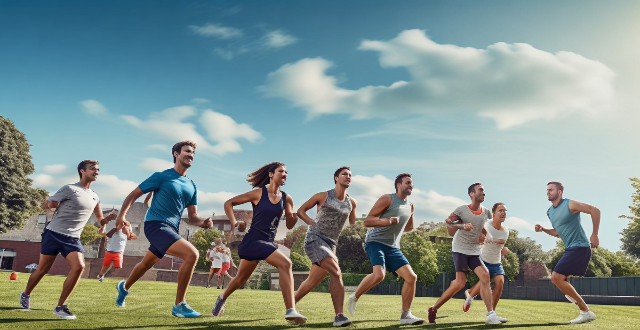Sports play a crucial role in shaping an individual's personality and character. They foster the development of social skills such as teamwork, leadership, and resilience. Participating in sports also builds self-confidence through achievement and overcoming fears. Additionally, sports promote discipline and time management by requiring consistent practice and training schedules. Goal setting is another important aspect of sports that teaches individuals about planning and focus. Finally, sports encourage healthy lifestyle habits by promoting physical fitness and raising awareness about proper nutrition. Overall, sports provide valuable experiences that contribute to personal growth and success in various aspects of life.

The Role of Sports in Shaping Personality and Character
Introduction
Sports have been an integral part of human society for centuries. They serve as a platform for physical activity, competition, and social interaction. However, the impact of sports extends beyond just physical health and fitness. In this article, we will explore how sports play a crucial role in shaping an individual's personality and character.
Development of Social Skills
Teamwork
Sports often involve working together as a team to achieve a common goal. This fosters the development of important social skills such as communication, cooperation, and compromise. By learning to work with others towards a shared objective, individuals gain valuable experience in navigating interpersonal relationships and resolving conflicts.
Leadership
Many sports require leaders who can guide their teammates towards success. Participating in sports provides opportunities for individuals to develop leadership skills, including decision-making, responsibility, and accountability. These qualities are not only beneficial on the field but also transferable to other areas of life.
Resilience
Sports teach individuals to persevere through challenges and setbacks. Losing a game or facing adversity can be difficult, but it also provides an opportunity to learn resilience. By bouncing back from failure and continuing to strive for improvement, individuals develop mental toughness that serves them well in all aspects of life.
Building Self-Confidence
Achievement
Achieving goals in sports can lead to a sense of accomplishment and self-confidence. Whether it's making a winning shot, improving personal best times, or simply completing a race, these achievements provide tangible evidence of one's abilities and efforts. This boost in confidence can translate into other areas of life, such as academics or career pursuits.
Overcoming Fears
Sports often push individuals outside of their comfort zones. Facing fears, such as performing under pressure or trying new techniques, helps build self-confidence by demonstrating that one is capable of overcoming obstacles. This mindset can be applied to various situations outside of sports, promoting a proactive approach to challenges.
Promoting Discipline and Time Management
Practice and Training
Success in sports requires dedication and discipline. Consistent practice and training schedules teach individuals the importance of time management and prioritization. By balancing sports commitments with other responsibilities, such as school or work, individuals learn effective strategies for managing multiple demands on their time.
Goal Setting
Sports often involve setting goals and working towards them systematically. This process teaches individuals about the value of planning, organization, and focus. By applying these principles to other areas of life, individuals can improve their productivity and achieve greater success in their endeavors.
Encouraging Healthy Lifestyle Habits
Physical Fitness
Participating in sports promotes regular physical activity, which is essential for maintaining good health. Regular exercise has numerous benefits for overall well-being, including reducing the risk of chronic diseases, improving mental health, and enhancing cognitive function. By developing a habit of regular exercise through sports participation, individuals establish a foundation for lifelong health.
Nutrition Awareness
Sports also raise awareness about the importance of proper nutrition for optimal performance. Athletes learn about the impact of different foods on their bodies and how to fuel themselves effectively for training and competition. This knowledge can lead to healthier eating habits both during and after their sports careers.
Conclusion
In conclusion, sports play a significant role in shaping an individual's personality and character by fostering the development of social skills, building self-confidence, promoting discipline and time management, and encouraging healthy lifestyle habits. Through participation in sports, individuals gain valuable experiences that contribute to their personal growth and success in various aspects of life.